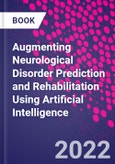Augmenting Neurological Disorder Prediction and Rehabilitation Using Artificial Intelligence focuses on how the neurosciences can benefit from advances in AI, especially in areas such as medical image analysis for the improved diagnosis of Alzheimer's disease, early detection of acute neurologic events, prediction of stroke, medical image segmentation for quantitative evaluation of neuroanatomy and vasculature, diagnosis of Alzheimer's Disease, autism spectrum disorder, and other key neurological disorders. Chapters also focus on how AI can help in predicting stroke recovery, and the use of Machine Learning and AI in personalizing stroke rehabilitation therapy.
Other sections delve into Epilepsy and the use of Machine Learning techniques to detect epileptogenic lesions on MRIs and how to understand neural networks.
Please Note: This is an On Demand product, delivery may take up to 11 working days after payment has been received.
Table of Contents
1. Intracranial Hemorrhage Detection and Classification2. Deep Learning for Non-Invasive Management of Brain Tumors
3. AI in Parkinson's disease symptoms identification and monitoring
4. Alzheimer's Disease Detection using Artificial Intelligence
5. Intelligent Computer Systems for Multiple Sclerosis Diagnosis
6. Current and future applications of artificial intelligence in Multiple Sclerosis
7. Artificial Intelligence Assisted Headache Classification Methods
8. Deep Learning for Reliable Detection of Epileptogenic Lesions
9. AI in Neurosciences Are we really there?
10. AI in the management of neurological disorders: Its prevalence and prominence
11. Graphical assessment of internal structure of some Parkinson disease data A case study
12. Applications of Artificial Intelligence to Neurological Disorders: A Review of Current Technologies and Open Problems
13. Developing a Chatbot/Intelligent system for Neurological diagnosis and management
14. Artificial Intelligence (AI) in the diagnosis and management of Acute Ischemic Stroke (AIS)








